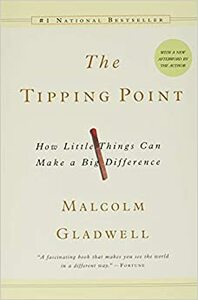You need to sign in or sign up before continuing.
Take a photo of a barcode or cover
2.3k reviews for:
Điểm bùng phát: làm thể nào những điểu nhỏ bé tạo nện sự khác biệt lớn lao?
Malcolm Gladwell
2.3k reviews for:
Điểm bùng phát: làm thể nào những điểu nhỏ bé tạo nện sự khác biệt lớn lao?
Malcolm Gladwell
I really don't think he said much new in this book. I'm surprised it's so highly regarded as I found it quite unoriginal. Who hasn't read about the Zimbardo experiments and NYC crime?
Super fascinating! I was waiting for everything to come full circle at the end of the book and it really didn’t. It is merely a book about what “The Tipping Point” is and nothing much more than that.
"The notion of \six degrees of separation\"" was originally devised and tested by a psychologist in the late sixties. He wondered whether people simply milled about in their own discrete social circles, or if the circles connected, web-like, much more pervasively than we expected. So, he mailed packages to sixty people in Omaha and asked them to deliver the packages to friends that might know a particular stockbroker in Sharon, Massachusettes. Travelling through friends-of-friends, the packages eventually reached the stockbroker, passing through five or six people each. Et voilà. We all start playing the Kevin Bacon game and filming movies starring Will Smith. As it turns out, we've been playing the game wrong; we should've been playing Six Degrees of Rod Steiger, because he is connected to more celebrities. Except that I've never heard of him, and Kevin Bacon's hot. (Technically, you could play it with any celebrity using this widget from the University of Virginia CS department.)
The Tipping Point delves into fashion, smoking, suicide, children's television, and even yawning to explain how ideas and movements spread like viruses. Did you yawn just then? A book for the memephilic."""
informative
inspiring
medium-paced
informative
medium-paced
A very interesting look at "How little things make a big difference" I read this for a book club and it provoked some interesting discussion. I found myself as I read this classifying friends into connector/maven/salesmen categories.
This book was fascinating. This book just opened by eyes up to a world I didn't know existed, and answered so many of my questions. As a young child and even now, I would wonder how things got popular. Who was the first one to use that item, or complete that act, and how did it grow. While this book was not able to answer all my very specific questions, it broadened my perspective to the whole thing. Furthermore, although being nonfiction, it was very entertaining. It held my attention the entire time, and although slow moving, I still was fixated on it the entire time. Whenever I stopped reading it I would always go back and think about it. It may not be for everyone, as it is a bit slow, but if you find this concept even the slightest bit interesting and are willing to give nonfiction a chance, I say give this a go.
Interesting. Easy to read. Like a conversation where Gladwell tells you what he's found out from researching word of mouth, context, and epidemics.
informative
reflective
fast-paced
I believe that this is better than Blink. I really enjoyed this book :-)

